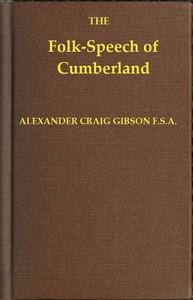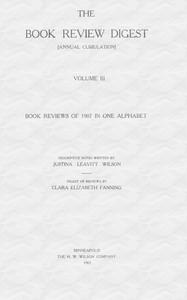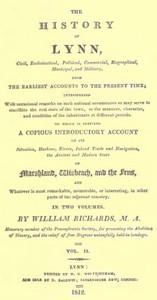Read this ebook for free! No credit card needed, absolutely nothing to pay.
Words: 204896 in 33 pages
This is an ebook sharing website. You can read the uploaded ebooks for free here. No credit cards needed, nothing to pay. If you want to own a digital copy of the ebook, or want to read offline with your favorite ebook-reader, then you can choose to buy and download the ebook.
THE HISTORY OF LYNN,
FROM THE EARLIEST ACCOUNTS TO THE PRESENT TIME, INTERSPERSED With occasional remarks on such national occurrences as may serve to elucidate the real state of the town, or the manners, character, and condition of the inhabitants at different periods.
LYNN: PRINTED BY W. G. WHITTINGHAM, AND SOLD BY R. BALDWIN; PATERNOSTER ROW; LONDON.
Miscellaneous remarks on the Reformation--its rise and progress on the continent--introduction into this island, and effects upon this town.
The reformation formed a new era in the history of the world, and was one of those mighty revolutionary events which have a most extensive and lasting effect on the affairs and destinies of mankind. But men have been ever since greatly divided in their ideas and judgments concerning it. While some have hailed it as a most happy, admirable, and glorious event, fraught with heaven's choicest blessings, it has been deemed by others, and even by a large majority of the inhabitants of christendom, as an exceedingly unfortunate, pernicious, and execrable occurrence, which has produced all manner of mischief, and, like the opening of Pandora's box, filled the world with calamities and miseries innumerable. The learned and the wise, as well as the illiterate and fly foolish, have been found among each of these opposite and contending parties: their respective opinions and allegations must therefore be entitled to a serious and candid hearing. But it is not intended here to go deeply or largely into this disputed subject: nor would it well accord with the plan or design of this publication. Some cursory hints, however, on a few of the most prominent facts will not, it is presumed, be either impertinent or uninstructive.
The information, like the French revolution, seems to have been too much admired by its friends, and too much vilified by its enemies. The former, for the most part, perceive nothing in it but what is praise worthy and divine, and the latter nothing but what is detestable and devilish. The truth, probably, lies somewhere about midway between these two extremes, as is usual in most of the disputes that divide and agitate the world. The reformation had certainly some good points in it, as well as some very bad ones, that can never be too much reprobated and detested. Had they been all bad, its friends would have defended them, for they have actually and unblushingly defended its very worst points; and had they been all good, its enemies, on the other hand, would not fail to condemn them, for they have really done so with its very best parts, whose intrinsic or essential goodness and beneficial tendency are most obvious and demonstrable.
The friends of the reformation consider the original and chief actors in that great revolutionary work as excellent men, actuated by a right apostolical and christian spirit, with a view to the restoration of primitive christianity, and the promotion of the best interests of mankind. Their opponents, on the contrary, consider them in a very different light, and hold them up as persons of a disreputable character, who were actuated by very unworthy and base motives, from whose thoughts nothing could be further than the restoration of genuine christianity, or the promoting of real benevolence, philanthropy, or human happiness. It will not be safe to give implicit credit to either of these representations. There were, certainly, some good men concerned in the reformation, and there were also some very bad men concerned in it, whose misdeeds ought never to be palliated; and these were probably the most numerous and the most powerful, or the work, surely, would have been more worthy of our praise and admiration.
Those who advocate the cause of the reformers say that their labours were abundantly fruitful of good works, and that their doctrine produced the happiest effects wherever it was received. But their opponents flatly deny it, and positively assert that the very reverse was actually the case: and they support their assertion, not only by referring to those long and bloody wars which resulted from the reformation, but also to the express testimony of credible witnesses, who affirm, that vice and immorality greatly increased wherever protestantism became predominant. Nor is it a little remarkable that these same witnesses are, for the most part, some of the very chief reformers; so that their evidence comes with a force that cannot well be resisted. Some of them belonged to the continent, and others to this kingdom; but we shall in this place bring forward only the former, reserving the latter till we come to exhibit the rise and progress of the reformation in this country.
CALVIN'S evidence in this case seems also to be equally forcible and decisive: "Of so many thousands seemingly eager in embracing the gospel, how few have since amended their lives? Nay, to what else does the greater part pretend, except by shaking off the heavy yoke of superstition to launch out more freely into every kind of lasciviousness?" Thus said Calvin. When the character of the reformation is duly and thoroughly considered, and especially that of Calvin's own doctrine, it is no great wonder that such effects should follow. It would have been much more wonderful if they had not followed; at least, when we further consider the abominable conduct, the vile and bloody deeds that were sanctioned by the same reformer's own example. Had he been a different sort of man, these unsightly fruits of his labours might have led him to doubt the soundness of his faith, or suspect that his creed did not altogether tally with the doctrine that is according to godliness. But from him it could not be expected.
Upon the whole, it seems impossible to evade the force of this evidence, or deny that vice and immorality increased where protestantism prevailed, and, consequently, that there must have been some radical and essential defect in that system from the very first: so that it must be the very height of folly, absurdity, and arrogance in our present pretended evangelical demagogues to attempt to hold it up to the people as a standard of unadulterated truth and model of christian perfection. It is remarkable enough that these good people, almost to a man, are very loud in their reprobation of the French revolution, although it might easily be proved that that same revolution was nearly, if not quite as honourable in its origin, and respectable in its progress as that which was excited and conducted by Martin Luther, John Calvin, and their coadjutors, and which they seem so much to admire, and so ready to commend and justify. While reprobating the Gallic revolution on account of the licentiousness and crimes it produced, they are not aware how much the protestant revolution is liable to the same imputation.
There does not seem on any point a greater difference of opinion between the admirers of the reformation and their opponents than that which relates to the real character of the reformers. Volumes have been written on both sides of the question: one party extolling them to the skies, as if they had been all perfect beings or angels of light, and the other degrading them to the lowest point, as if they had been no better than so many demons. Too much, no doubt, has been said both for and against them. We must not believe them to be quite so bad as some catholic writers have represented them; nor yet, on the other hand, altogether so good and perfect as they have been described by the generality of our protestant authors. What is unfounded on either side we wish to explode; but some apparently well established facts relating to the reformers, and not generally known among protestants, ought not here to be passed over unnoticed, as they are well calculated to correct the reader's ideas, both as to the reformers and the reformation.
Free books android app tbrJar TBR JAR Read Free books online gutenberg
More posts by @FreeBooks

: Folk-Speech of Cumberland and Some Districts Adjacent Being Short Stories and Rhymes in the Dialects of the West Border Counties by Gibson Alexander Craig - English language Dialects England Cumberland Texts


: The Cumulative Book Review Digest Volume 3 1907 Complete in a single alphabet by Various - Books Reviews Periodicals







